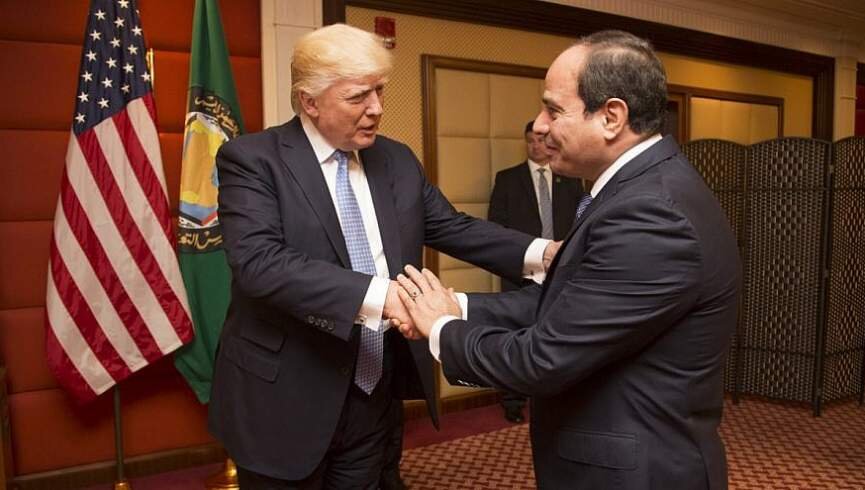TEHRAN - The U.S. president’s support for his favorite dictator, despite the unprecedented protests against Abdel Fattah el-Sisi in Egypt, indicates Washington’s dual policies toward regional countries. Egypt has recently experienced major changes in its political arena, and people for the first time in years formed wide and general protests against Egyptian president Abdel Fattah el-Sisi.
The nationwide protest began last Friday, with thousands of citizens coming to streets and chanting “el-Sisi must go”. It is kind of a reminder of the protests that led to the victory of revolution on January 25, 2011.
The protests and slogans against the Egyptian president were so intense that his pictures were taken down and ripped in various cities. It is the first time since the fall of Mohamad Mursi’s administration through military coup in July, 2013 that Egypt witnesses such wide protests against the government.
Al-Tahrir Square is a symbol of revolution and protests, and also a place for Egyptian extensive protests. It should be noted that popular protests in Egypt has started following the request of the Egyptian artist and businessman Muhammad Ali.
The security forces tried to disperse protestors by tear gas and attacking. These forces have arrested about 700 people since the beginning the choas in Egypt.
Mohamad Ali promised to take next steps after the protestors left, and asked Egyptian Minister of Defense Mohamed Ahmed Zaki to arrest el-Sisi because of killing Egyptians. He has recently threated to release news about arresting some corrupt elements related to the Egyptian president’s office. Mohamad Ali also criticized the sale of Tiran and Sanafir islands to Saudi Arabia, and said if el-Sisi do not step down by Friday, people would dismiss him and end his (political) life.
But in the meanwhile, Trump’s position toward widespread protests in Egypt should be considered. He supported el-Sisi, saying there might be protests in every countries and against everyone. Egypt has a great leader, he is very respectable. There was chaos before el-Sisi’s administration, but there is no chaos anymore since he came to power.
Trump stated that he is not worried about the protests in Egypt because they are carried out in every countries. There were protest even during Barack Obama’s presidency.
Abdel Fattah el-Sisi, who has travelled New York to attend UN General Assembly meetings, has made considerable remarks about his American counterpart. He claimed that “political Islam” is the cause of the chaos in the region. El-Sisi said that public opinion will not accept the rule of political Islam groups, and as long as these groups are trying to seek power, the region will remain unstable.
This is not the first time that Trump explicitly backed el-Sisi, regardless of his actions and policies in the country, and violating freedom of speech. Last month, Trump stated one of his most controversial remarks about el-Sisi. “Where is my favorite dictator?” Trump said as he was about to meet el-Sisi outside a hotel in Biarritz, France. After Trump’s words the audience became silent.
Trump’s interpretation indicates that he believes in el-Sisi’s dictatorship nature but does not willing to lose an ally such Egypt in the region. El-Sisi has interfered in many important regional cases since taking the power. Following Saudi Arabia’s hostile policies against Qatar is an example of these actions. Saudi Arabia, Egypt, the UAE and Bahrain cut their diplomatic ties with Qatar on June 5, 2017 by claiming Doha’s support for terrorism.
Egypt also participated in Saudi-led coalition against Yemen, and dispatch military forces to attack the country. In fact, it can be said that el-Sisi follows Riyadh’s policies and obeys the orders of its leaders on regional issues.
Since the beginning of el-Sisi’s administration, human rights organizations has repeatedly warned about deteriorating human rights and freedom of speech in the country, with many claiming Egypt has become more like a large prison.
El-Sisi’s move in overthrowing Mohamad Mursi and opposing with the establishment of a religious rule are among the approaches that are very pleasant to Trump. Of course it should be noted that Egypt’s arms contracts with the U.S., like other Arab countries in the Middle East, have great benefits for Washington. Egypt is important to the U.S. in terms of providing easy access to Suez Canal, which is why the U.S. Department of State, despite affirming the violation of human rights in Egypt, has agreed with giving $ 1.3 bn military aid to the country.
It can be said that U.S. support for dictatorship around the world, especially in the Middle East, is not something new and strange. This time the issue is completely highlighted in case of Abdel Fattah el-Sisi and Egypt. The country is of great importance for the U.S. and implementing Washington’s policies in the Middle East in the shadow of Cairo’s strict adherence to the policies of U.S. actor, Saudi Arabia. Trump has backed el-Sisi several times by ignoring extensive and unprecedented protests. Meanwhile, a smaller-scale protest in every countries that are opposite the U.S. leads to Washington’s support for the protesters, and the U.S. will do its best to internationalize the protests.


No comments:
Post a Comment